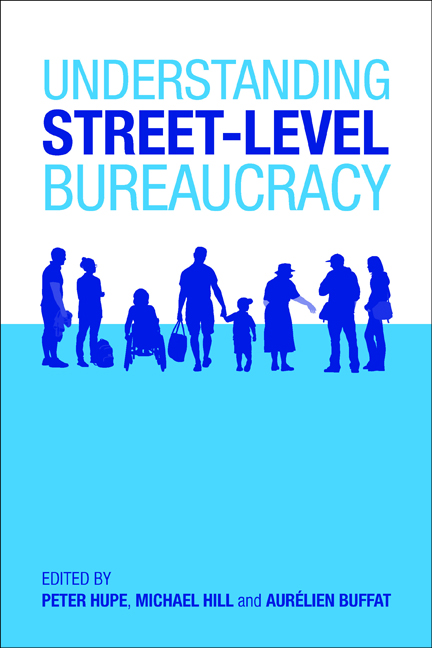Book contents
- Frontmatter
- Contents
- Biographical notes
- Preface
- Part One Introduction
- Part Two Delivering services and benefits: street-level bureaucracy and the welfare state
- Part Three Agents of the state: street-level bureaucracy and law enforcement
- Part Four Embedded in society: street-level bureaucrats as public actors
- Part Five The management of street-level bureaucrats
- Part Six The promise of professionalism
- Part Seven Conclusion
- References
- Index
Eight - Street-level bureaucrats and regulatory deterrence
Published online by Cambridge University Press: 08 March 2022
- Frontmatter
- Contents
- Biographical notes
- Preface
- Part One Introduction
- Part Two Delivering services and benefits: street-level bureaucracy and the welfare state
- Part Three Agents of the state: street-level bureaucracy and law enforcement
- Part Four Embedded in society: street-level bureaucrats as public actors
- Part Five The management of street-level bureaucrats
- Part Six The promise of professionalism
- Part Seven Conclusion
- References
- Index
Summary
Introduction
One important strand of scholarship about street-level bureaucrats concerns those who serve as enforcement agents at the front lines of regulatory activity. These include, to name but a few, building inspectors, environmental enforcement agents, fish and game officers, health and safety inspectors, immigration and customs agents, licensing and fraud inspectors, police on the beat, and revenue agents. Given the increased role of employment and social workers in assessing compliance with work and welfare rules, social service front-line employees have also taken on important regulatory enforcement roles. As with any street-level bureaucrat, regulatory agents typically have a good deal of autonomy and discretion in how they go about enforcing regulations within broad parameters established by agency guidelines and routines. They have discretion over the thoroughness with which they conduct inspections or reviews, and latitude in the manner with which they interact with those they regulate.
Much of the literature about regulatory agents (see May and Winter, 2011) focuses on their behaviours in enforcing regulations, as typified by studies of inspectors charged with assessing compliance with rules and taking actions when non-compliance is found. Consideration of the enforcement behaviours of regulatory agents draws attention to different ways of bringing about compliance. The literature concerning this suggests that individuals and firms comply with rules because they either fear detection of violations and punishment for them, feel a civic duty to comply, or feel social pressure to comply (see Burby and Paterson, 1993; Winter and May, 2001; Nielsen and Parker, 2012). These constitute calculated, normative and social motivations for compliance. While such motivations are important for compliance, the willingness to comply is hardly enough if those who are regulated do not have the ability to do so in terms of their awareness of rules and capability to comply.
These considerations about compliance raise a basic question that is the focus of this chapter: how do the actions and behaviours of regulatory agents affect regulatees’ perceptions that non-compliance with rules will be detected? Answering this gets at the perceptions and consequences of the use of discretion by regulatory agents in choosing what to inspect, the thoroughness of inspection and the style of interactions with regulated entities.
- Type
- Chapter
- Information
- Understanding Street-Level Bureaucracy , pp. 133 - 152Publisher: Bristol University PressPrint publication year: 2015
- 1
- Cited by



